Jorge Mario Bergoglio was born on December 17, 1936, and died on April 21, 2025.
He entered the world at a time when fascism was rising, dictators were consolidating power, sovereign nations were being invaded, and the global economy teetered on collapse. Faith in democracy—and in the goodness of humanity—was eroding.
On Easter Monday, Pope Francis left this world—a world that resembles the one he was born into in many ways. Even in America, long considered a citadel of liberty and justice, the dark forces of imperialism and autocracy are once again on the rise.
But let me be clear: the forces I speak of are not partisan nor aimed at any one person. They thrive on division, fear, and dehumanization—regardless of their political form. Pope Francis urged us to resist them all, even when they masqueraded as strength or conviction. His voice did not stoke conflict. It awakened conscience.
When Jorge was born, he could do nothing about the ills of the world. Now that he is gone, he can no longer help us face them.
But while he lived, he helped.
He visited the poor, the sick, the forgotten, and the grieving. He stood beside orphans, war victims, the mentally ill, the abused, the hungry, and the outcast. He prayed with mothers in war zones, blessed multitudes in the streets, and opened the Church’s arms to those once shut out. He welcomed the oppressed—and forgave the oppressors. He called the Church not to retreat into doctrine but to open its heart to the Gospel. He spoke truth to power, and perhaps more rarely, he used his power to speak truth to his own conscience.
He traveled the world on journeys that would exhaust men half his age. But he never stopped. He kept going, propelled by the adrenaline of faith. And in doing so, he gave the world a reason to believe in miracles again.
When he was chosen to be Pope, it felt as if a dove had landed on the roof of the Sistine Chapel. The first pope from the Americas. The first Jesuit pope. The first to take the name Francis.
When he stepped onto the balcony overlooking St. Peter’s Square for the first time, he humbly asked the people not to pray for the Church, but to pray for him.
Has there ever been a humbler leader?
But humility alone is not enough. Without courage, it becomes a clever form of cowardice. Without intelligence, it is powerless. Francis had all three—humility, courage, and intelligence—the holy trinity of virtues.
He understood us. He never placed himself above the people he served. He fought for the values that make us fully human. That is what integrity looks like.
He also affirmed the Church’s teaching on the sanctity of life, including abortion, which he called a grave moral concern. But he reminded us that no single issue exists in isolation. The call to protect life must be consistent, merciful, and whole—from womb to tomb. It includes the lives of migrants, the poor, the imprisoned, the environment, victims of violence, and yes, even our political adversaries.
Francis once said, “The worst discrimination which the poor suffer is the lack of spiritual care.” I believe he meant that reducing anyone—even those we disagree with—to a slogan or a side is a spiritual failure. Easter is about life, yes—but also about transformation, forgiveness, and breaking every tomb that keeps us from loving fully.
He also reminded us, “Before all else, the Gospel invites us to respond to the God of love who saves us, to see God in others, and to go forth from ourselves to seek the good of others.” That, to me, is the Franciscan heart of his papacy: not a doctrine to memorize, but a love to embody.
The Church will never be the same without him. But the Church also made this man. And for that, it can be not only proud, but reinvigorated—to keep going, to keep trying, to continue being an institution that liberates rather than binds, heals rather than harms, shows mercy rather than judgment, and stands against wickedness, intolerance, injustice, war, greed, and nationalism—the diseases that corrupt the soul.
Now that Francis is gone, may his spirit live on. His legacy endures as long as we choose to practice it.
Some leaders are chosen. Some are elected. Some seize power for themselves. But Francis was the kind of leader who made his way by walking with others. And after walking with so many, the path itself became clearer.
He was not chosen; he was blessed to choose. He was not elected; he was seen, and given an opportunity. And he took nothing by force, because he knew the greatest force is the Holy Spirit that lives within each of us.
And how beautiful life becomes when we let that force lead us.
So I ask you—as Pope Francis so often did—let us not be overcome by anger, suspicion, or division. In times of confusion, we are called not to inflame one another, but to encounter one another—with truth, with mercy, and with a desire for the common good.
The life of Pope Francis teaches us that peace is not made with slogans or scapegoats, but with real acts of humility, compassion for the poor, and love for creation.
May we all find the courage to listen more than accuse, to serve more than condemn, and to heal more than wound.
May God bless you—and guide us all.



